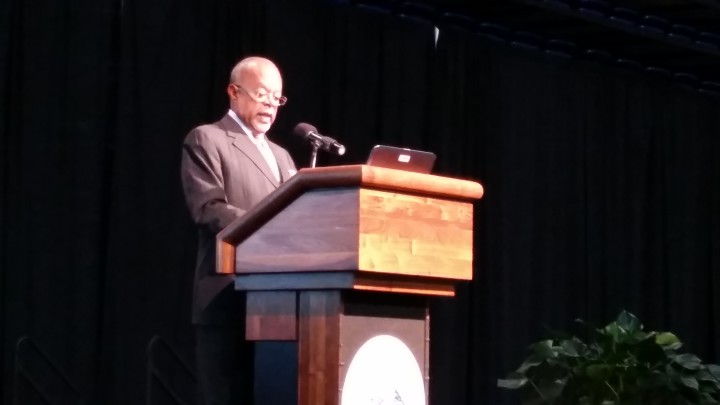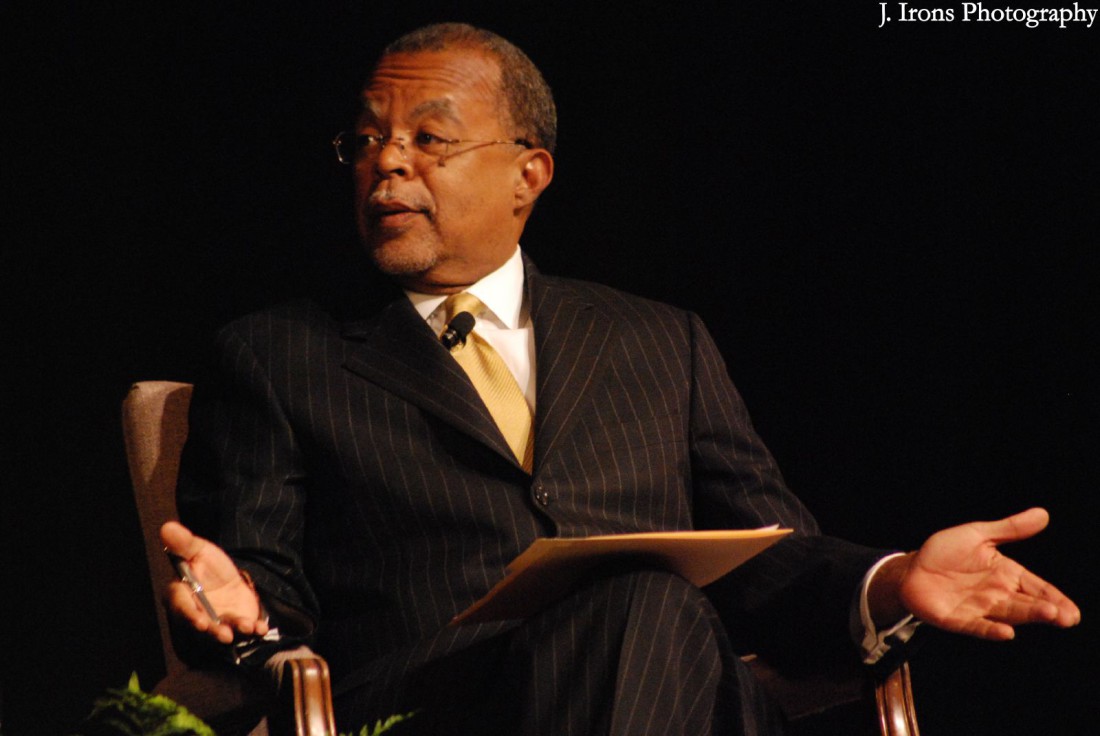Henry Louis Gates Jr. loves genealogy, and that passion is infectious.
It started when he was 9, Gates told an audience estimated by event organizers to be about 1,500 people. After the death of his grandfather, Gates’ father showed him and his brother a photo of their great-great grandmother, Jane Gates (1819-1888), a former slave who owned her own home and raised five children. The home is still in the family.
Gates, a Harvard professor and host of the PBS series, “Finding Your Roots,” delivered the keynote address at UNC Asheville’s Kimmel Arena on Nov. 5 for the celebration of the Center for Diversity Education’s 20th anniversary. The lecture opened with clips from the television series, including a poignant moment when Rep. John Lewis learns his ancestor registered to vote in 1867. The evening also honored the original members of the Asheville Student Committee on Racial Equality, a group of student racial-equality activists that operated here from 1960-1965.
The day after his grandfather’s funeral, Gates bought a composition notebook and interviewed his parents, trying to learn all he could about his ancestry from their memories.
Years later, he would watch the television series, “Roots” and develop what he calls, “Roots envy,” because he could find nothing of his family roots beyond his great-grandmother. Slaves were not recorded in any U.S. census before 1870, so most African-Americans’ family records stop there.
He wanted to be able to trace his roots back to Africa, to learn where his family came from, and in 2000, he learned that mitochondrial DNA could pinpoint the region of his ancestry with a decent degree of accuracy.
“I had thought my people came from West Africa, since that’s where the slave trade originated,” he said.
But his ancestry is from Sudan; he is Nubian, the people who were leaders of Egypt from 750-650 B.C.

Later testing would determine half of his ancestry is white, stemming from Ireland. It is likely his great-great grandmother’s children were fathered by a man of Irish descent.
Gates discovered he could learn more about African Americans’ ancestry by cross-referencing the 1870 census with records of whites with the same last names from previous census records.
When the idea came to Gates that he could do a television show helping people to find their ancestries, he called his friend, Quincy Jones and asked him to help recruit Oprah Winfrey. He knew he needed big names to get the funding he would need to produce a television show.
When Oprah called him back, he knew he was going to be able to produce the show even before she said anything.
“Rich people don’t call you in-person with bad news,” he said.
The show, “African-American Lives,” featured Jones and Winfrey, Morgan Freeman, Ben Carson, Chris Rock, Don Cheadle and other prominent African-Americans. More than 8 million viewers tuned in.
It was when a woman told him she thought the show was racist that Gates decided to include others.
“I was like Noah,” he said. “I had two black people, 2 Jews, two Asians, two white people … and Meryl Streep because she’s Meryl Streep.”
Gates dispelled three African-American ancestry myths:
- Igbo Princess
- “We were never slaves”
- “High cheekbones and straight black hair: Have I told you about my Cherokee grandmother?”
A number of African-Americans have told him the same story, of being descended from an Igbo princess who was seen by a German baron, who was immediately smitten with her. He paid for her, took her north and married her.
“You don’t have an Igbo princess in your tree and your ancestors were slaves,” he said.
As for the Cherokees, few slaves encountered Cherokees, and DNA analysis shows African-Americans have an average of less than 1 percent Native American DNA.
“Your straight hair came from your white ancestors,” he said.
Gates closed by suggesting African-American children who are in struggling schools might benefit from learning about their genealogy, starting with swabbing their own cheeks for tests. In the six weeks it takes for results to come back, they can learn the science behind the tests.
“Then you take them down the hall and teach them how to learn more about their own ancestry, starting with interviewing their own parents and grandparents,” he said. “Tell me they won’t be excited about learning this. … Your ancestors died for the right for you to learn.”
The third season of “Finding Your Roots” will air on PBS beginning in January.




Hm, it appears we’re not related.